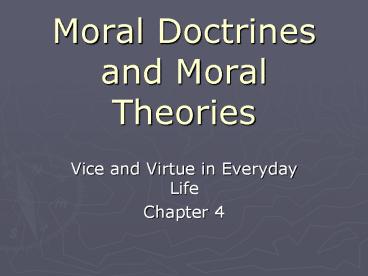Moral Doctrines and Moral Theories - PowerPoint PPT Presentation
1 / 21
Title:
Moral Doctrines and Moral Theories
Description:
Moral Doctrines and Moral Theories Vice and Virtue in Everyday Life Chapter 4 The Experience Machine, Nozick What matters to us, apart from having pleasant conscious ... – PowerPoint PPT presentation
Number of Views:146
Avg rating:3.0/5.0
Title: Moral Doctrines and Moral Theories
1
Moral Doctrines and Moral Theories
- Vice and Virtue in Everyday Life
- Chapter 4
2
The Experience Machine, Nozick
- What matters to us, apart from having pleasant
conscious experiences? - First, we want to actually do certain things.
- Second, we want to be a certain kind of people.
3
The Experience Machine, Nozick
- Third, we do not want to be limited to a man-made
reality.
4
The Judeo-Christian Tradition
- Genesis Creation and Fall
- Exodus The 10 Commandments and other moral
prescriptions for Israel - Psalms Happiness in knowing and following God
5
The Judeo-Christian Tradition
- The Sermon on the Mount Human fulfillment
through an inner moral and spiritual
transformation
6
Morality is Based on Gods Commands, Mortimer
- The Divine Command Theory of Ethics Gods will
determines what is right and what is wrong. - The ethical person is both merciful and just.
7
Why Morality Does Not Depend on Religion, Arthur
- The Nature of Morality
- The Nature of Religion
- What is the connection between morality and
religion?
8
Why Morality Does Not Depend on Religion
- Religion might motivate moral behavior.
- Perhaps God provides us with moral knowledge.
- Arthurs rejection of these 2 claims
9
Why Morality Does Not Depend on Religion
- The Euthyphro Dilemma
10
Of Benevolence, Hume
- Hume believes that all knowledge is based on
experience. - Morality is grounded in our human sentiments.
- Benevolence is the key moral sentiment.
11
The Ones Who Walk Away from Omelas, Le Guine
- Le Guines description of the happiness of the
many in Omelas - Le Guines description of the misery of the one
child
12
The Ones Who Walk Away from Omelas
- Why do some people walk away from Omelas?
- What implications does this have for the
credibility of utilitarianism?
13
Utilitarianism, Mill
- Mills Principle of Utility
- Mills Definition of Happiness
- There is a difference between the higher and
lower pleasures. - How do we discover which pleasures are better?
14
A Critique of Utilitarianism, Williams
- Utilitarianism sometimes might require us to do
the wrong thing. - The case of George
- The case of Jim and Pedro
15
A Critique of Utilitarianism
- Integrity and the value of our deeply held
projects pose problems for utilitarianism.
16
Good Will, Duty, and the Categorical Imperative,
Kant
- Kant believes that only a good will is
unconditionally good. - The person of good will does her duty for dutys
sake.
17
Kant contd.
- Kants analysis of the moral worth of actions
impulse, reason, and duty. - Hypothetical and Categorical Imperatives
- The Categorical Imperative act only on that
maxim whereby thou canst at the same time will
that it should become a universal law.
18
The Holocaust and Moral Philosophy, Sommers
- Introduction religion, morality, and the
Holocaust - Doing wrong vs. wrongdoing
- The rationalist approach to morality, e.g. Kant
19
The Holocaust and Moral Philosophy
- The sentimentalist approach to morality, e.g.
Hume - Moral philosophy should prohibit cruelty to
sentient non-persons.
20
A Critique of Kantianism, Taylor
- The problem with many moral philosophers is their
lack of appreciation for the pain and sorrow that
exist in the world. - Such moralists focus on solving abstract
philosophical problems.
21
A Critique of Kantianism
- Kant failed to realize that there may be no true
morality. - Kants theory is divorced from concrete human
nature and experience. - We must find moral answers that work.































